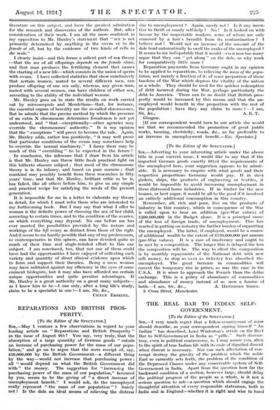REPARATIONS AND BRITISH PROS- PERITY.
[To the Editor of the SPECTATOR.] Sin,—May I venture a few observations in regard to your leading article on "Reparations and British Prosperity" in the issue of August 9th? You say, very truly, that the absorption of a large quantity of German goods "entails an increase of purchasing power for the mass of our popu- lation," and go on to argue that the mere receipt of, say, 250,000,000 by the British Government—a different thing by the way—would not increase that purchasing power : all "would depend on what the British Government did with" the money. The suggestion for "increasing the purchasing power of the mass of our population," favoured by you, seems to be the giving of "a direct increase of unemployment benefit." I would ask, do the unemployed really represent " the mass of our, population " ? Surely not .1 Is the dole an ideal means of relieving the distress
due to unemployment ? Again, surely not ! Is it any incen- tive to thrift or manly self-help ? No I Is it looked on with favour by the respectable workers, some of whom are only removed by a hair's breadth from its contamination ? I believe not ! Would not an increase of the amount of the dole tend automatically to swell the ranks of the unemployed? It seems to me indisputable that it would—even now too many argue that they can "get along" on the dole, so why work for comparatively little more ?
Reparation payments from Germany ought in my opinion to be applied to reparations, to relieving the mass of the popu- lation, not merely a fraction of it, of some proportion of those burdens of the War which depress the vitality of the nation as a whole. They should be used for the quicker redemption of debt incurred during the War, perhaps particularly the debt to America. There can be no doubt that British pros- perity would be increased by this means and that the un- employed would benefit in due proportion with the rest of the population : have they any claim to more ? —I am, [If our correspondent would turn to our article she would see that we recommended the promotion of great public works, housing, electricity, roads, &c., as far preferable to an increase in unemployment benefit.—En. Spectator.]


































 Previous page
Previous page